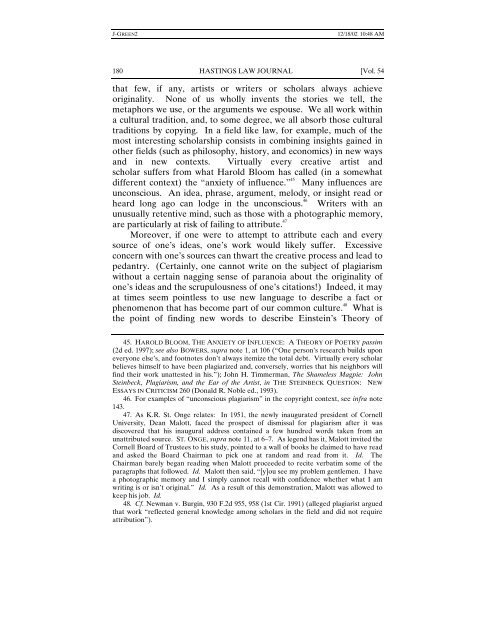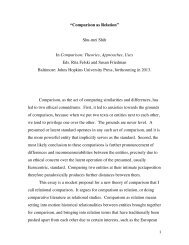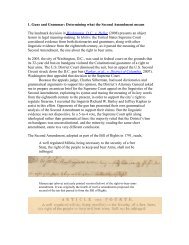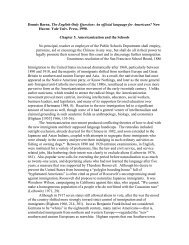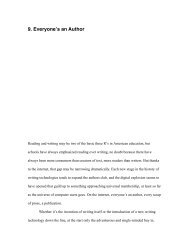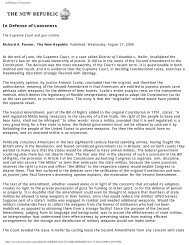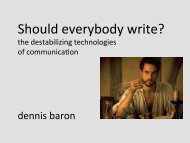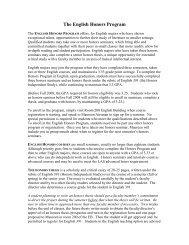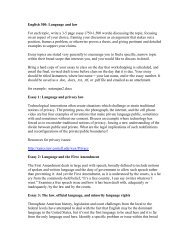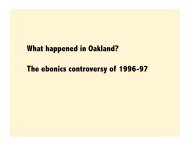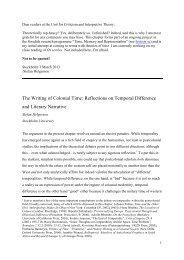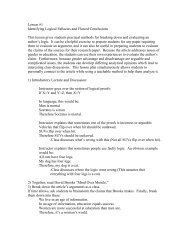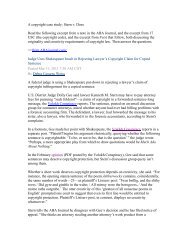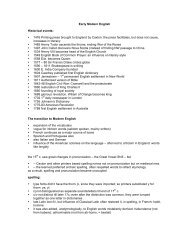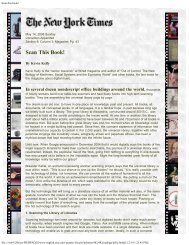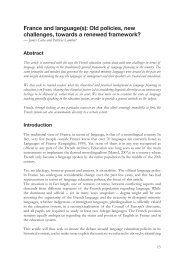Plagiarism, Norms, and the Limits of Theft Law: Some ... - English
Plagiarism, Norms, and the Limits of Theft Law: Some ... - English
Plagiarism, Norms, and the Limits of Theft Law: Some ... - English
You also want an ePaper? Increase the reach of your titles
YUMPU automatically turns print PDFs into web optimized ePapers that Google loves.
J-GREEN2 12/18/02 10:48 AM<br />
180 HASTINGS LAW JOURNAL [Vol. 54<br />
that few, if any, artists or writers or scholars always achieve<br />
originality. None <strong>of</strong> us wholly invents <strong>the</strong> stories we tell, <strong>the</strong><br />
metaphors we use, or <strong>the</strong> arguments we espouse. We all work within<br />
a cultural tradition, <strong>and</strong>, to some degree, we all absorb those cultural<br />
traditions by copying. In a field like law, for example, much <strong>of</strong> <strong>the</strong><br />
most interesting scholarship consists in combining insights gained in<br />
o<strong>the</strong>r fields (such as philosophy, history, <strong>and</strong> economics) in new ways<br />
<strong>and</strong> in new contexts. Virtually every creative artist <strong>and</strong><br />
scholar suffers from what Harold Bloom has called (in a somewhat<br />
different context) <strong>the</strong> “anxiety <strong>of</strong> influence.” 45 Many influences are<br />
unconscious. An idea, phrase, argument, melody, or insight read or<br />
heard long ago can lodge in <strong>the</strong> unconscious. 46 Writers with an<br />
unusually retentive mind, such as those with a photographic memory,<br />
are particularly at risk <strong>of</strong> failing to attribute. 47<br />
Moreover, if one were to attempt to attribute each <strong>and</strong> every<br />
source <strong>of</strong> one’s ideas, one’s work would likely suffer. Excessive<br />
concern with one’s sources can thwart <strong>the</strong> creative process <strong>and</strong> lead to<br />
pedantry. (Certainly, one cannot write on <strong>the</strong> subject <strong>of</strong> plagiarism<br />
without a certain nagging sense <strong>of</strong> paranoia about <strong>the</strong> originality <strong>of</strong><br />
one’s ideas <strong>and</strong> <strong>the</strong> scrupulousness <strong>of</strong> one’s citations!) Indeed, it may<br />
at times seem pointless to use new language to describe a fact or<br />
phenomenon that has become part <strong>of</strong> our common culture. 48 What is<br />
<strong>the</strong> point <strong>of</strong> finding new words to describe Einstein’s Theory <strong>of</strong><br />
45. HAROLD BLOOM, THE ANXIETY OF INFLUENCE: A THEORY OF POETRY passim<br />
(2d ed. 1997); see also BOWERS, supra note 1, at 106 (“One person’s research builds upon<br />
everyone else’s, <strong>and</strong> footnotes don’t always itemize <strong>the</strong> total debt. Virtually every scholar<br />
believes himself to have been plagiarized <strong>and</strong>, conversely, worries that his neighbors will<br />
find <strong>the</strong>ir work unattested in his.”); John H. Timmerman, The Shameless Magpie: John<br />
Steinbeck, <strong>Plagiarism</strong>, <strong>and</strong> <strong>the</strong> Ear <strong>of</strong> <strong>the</strong> Artist, in THE STEINBECK QUESTION: NEW<br />
ESSAYS IN CRITICISM 260 (Donald R. Noble ed., 1993).<br />
46. For examples <strong>of</strong> “unconscious plagiarism” in <strong>the</strong> copyright context, see infra note<br />
143.<br />
47. As K.R. St. Onge relates: In 1951, <strong>the</strong> newly inaugurated president <strong>of</strong> Cornell<br />
University, Dean Malott, faced <strong>the</strong> prospect <strong>of</strong> dismissal for plagiarism after it was<br />
discovered that his inaugural address contained a few hundred words taken from an<br />
unattributed source. ST. ONGE, supra note 11, at 6–7. As legend has it, Malott invited <strong>the</strong><br />
Cornell Board <strong>of</strong> Trustees to his study, pointed to a wall <strong>of</strong> books he claimed to have read<br />
<strong>and</strong> asked <strong>the</strong> Board Chairman to pick one at r<strong>and</strong>om <strong>and</strong> read from it. Id. The<br />
Chairman barely began reading when Malott proceeded to recite verbatim some <strong>of</strong> <strong>the</strong><br />
paragraphs that followed. Id. Malott <strong>the</strong>n said, “[y]ou see my problem gentlemen. I have<br />
a photographic memory <strong>and</strong> I simply cannot recall with confidence whe<strong>the</strong>r what I am<br />
writing is or isn’t original.” Id. As a result <strong>of</strong> this demonstration, Malott was allowed to<br />
keep his job. Id.<br />
48. Cf. Newman v. Burgin, 930 F.2d 955, 958 (1st Cir. 1991) (alleged plagiarist argued<br />
that work “reflected general knowledge among scholars in <strong>the</strong> field <strong>and</strong> did not require<br />
attribution”).


